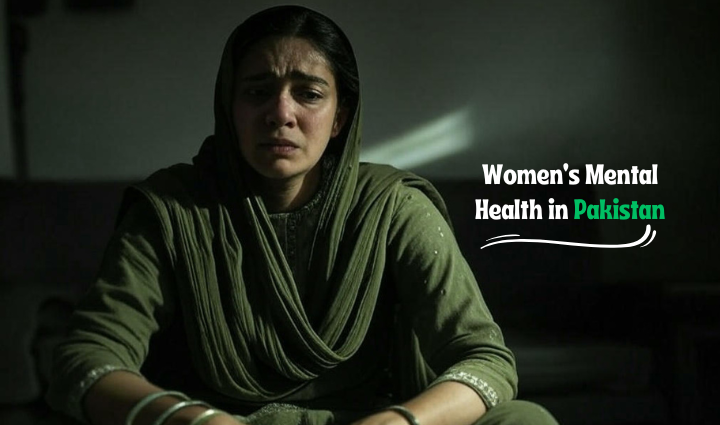
Women’s Mental Health in Pakistan A Hidden Struggle We Must Fix
- March 21, 2025
- 0 Likes
- 7274 Views
- 0 Comments
In Pakistan, women’s mental health is a serious issue that doesn’t get enough attention. Many women face depression, anxiety, and trauma every day, but they often suffer quietly. With little access to help and a culture that shames mental struggles, millions are left to cope alone. This article looks at women’s mental health in Pakistan, the challenges they face, and what we can do to make things better.
Why Mental Health Hits Pakistani Women Harder
Mental health problems affect women in Pakistan more than men. Studies show women lose far more healthy years to depression twice as much as men. This gap comes from the tough realities women deal with, like pressure from society and unfair treatment. Depression and anxiety are common, and they’re often caused by things men don’t face as much.
What makes it worse? Culture, violence, and limited options create a tough life for many women. From abuse at home to feeling stuck with no way out, Pakistani women deal with a lot. To fix women’s mental health in Pakistan, we need to understand these problems and find ways to help.
How Culture Hurts Women’s Minds
Pakistan has a strong male-led culture that shapes women’s lives. Traditions like honor killings (Karo Kari), forced marriages, and dowry demands put huge stress on women. These rules often say a woman’s worth is about family pride or money, not her own happiness.
Gender-based violence in Pakistan is another big problem. Research says up to 90% of women face verbal or mental abuse, and 50% get physically hurt by their partners. This violence can lead to serious issues like depression, anxiety, or even trauma that lasts years. Divorce is frowned upon, so many women stay in bad situations, which hurts their mental health even more. We need to change these old ways to protect women’s minds.
The Shame Around Mental Health in Pakistan
A huge roadblock for women’s mental health in Pakistan is the shame tied to it. Many people see mental struggles as a weakness or something caused by spirits, not a real health issue. This mental health stigma in Pakistan stops women from asking for help they’re afraid of being judged.
Friends and family could help, but they often make it worse by agreeing with these wrong ideas. In villages, women who talk about their feelings might get ignored or pushed away. Even in cities, where people know a bit more, women worry about being called “crazy.” This fear keeps them quiet and suffering. We have to break this stigma so women feel safe getting support.
Not Enough Help to Go Around
Even when women want help, there’s not much available. Pakistan has very few mental health experts only one psychiatrist for every 10,000 people who need one. With over 200 million people in the country, that’s a huge problem. There aren’t many places to go for care, especially for women in rural areas or those who can’t pay.
This means depression or trauma often goes untreated. Without good, affordable mental health care in Pakistan, women have to figure it out on their own or they can’t. Fixing this means more doctors and places to get help that fit Pakistan’s culture.
Money and School Struggles
Not having money or education makes things harder for women’s mental health. Many Pakistani women don’t get to go to school or work, so they stay home doing chores without pay. This can make them feel worthless or alone, which feeds into mental health issues for Pakistani women.
Big events like COVID-19 or floods make it even tougher. These crises add money worries and more abuse at home. Women, who often take care of everyone else, get hit hardest with no one to lean on. Giving women chances to learn and earn could help them feel stronger and happier.
How Pakistan Compares
Pakistani women are doing a bit better than some neighbors in South Asia. City women sometimes get to study or work like people in richer countries. But rural women miss out on this. Compared to places like Afghanistan, where women have fewer rights, Pakistan has hope but it’s not enough yet. We need to help all women, no matter where they live.
Why This Matters to Everyone
When women’s mental health in Pakistan suffers, it affects more than just them. Women take care of kids and homes, so if they’re struggling, families and communities feel it too. Ignoring this can keep poverty and problems going for years. Helping women’s minds is a way to help all of Pakistan grow stronger.
What We Can Do About It
Fixing this takes work from everyone. Here are some ideas to improve mental health care for women in Pakistan:
- Talk About It: Share info to stop the mental health stigma in Pakistan and show it’s okay to get help.
- Make Laws Stronger: Protect women from gender-based violence in Pakistan with rules that work.
- Give Chances: Help women go to school and get jobs so they feel in control.
- Add More Help: Train more mental health workers and open places women can go.
- Fit the Culture: Make support that respects Pakistan’s ways but puts women first.
Groups like BasicNeeds Pakistan are already helping, but they need more support from the government and the world to really change things.
You Can Help Take Action Now
Women’s mental health in Pakistan isn’t just a health problem it’s about fairness and rights. You can help make a difference. Check out Umeed, a service offering online therapy for Pakistani women dealing with anxiety, depression, and more. Here’s what you can do:
- Spread the News: Share this article to tell people about mental health issues for Pakistani women.
- Back Umeed: Visit Umeed.com.pk to see how they help with counseling maybe donate or volunteer.
- Speak Up: Ask leaders to fund mental health care in Pakistan and stop violence against women.
Every little bit helps. Go to Umeed.com.pk today to support women’s mental health or just to learn more. What will you do to help? Tell us below or share this with friends. Together, we can stop the silence.
